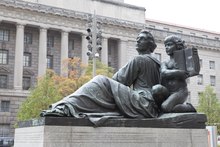
Back حرية الدين في الولايات المتحدة Arabic Religionsfreiheit in den Vereinigten Staaten German Kebebasan beragama di Amerika Serikat ID په متحده ایالاتو کې د دین ازادي Pashto/Pushto

| Freedom of religion |
|---|
| Religion portal |
In the United States, freedom of religion is a constitutionally protected right provided in the religion clauses of the First Amendment.[1] As stated in the Bill of Rights: "Congress shall make no law respecting an establishment of religion, or prohibiting the free exercise thereof...". Freedom of religion is linked to the countervailing principle of separation of church and state, a concept advocated by Colonial founders such as Dr. John Clarke, Roger Williams, William Penn, and later Founding Fathers such as James Madison and Thomas Jefferson.[2][3]
The way freedom of religion is interpreted has changed over time in the United States and continues to be controversial. The issue was a major topic of George Washington's Farewell Address. Several American states had their own official state churches both before and after the First Amendment was passed.[4] Illegal religion was a major cause of the 1890–1891 Ghost Dance War. Starting in 1918, nearly all of the pacifist Hutterites emigrated to Canada when Joseph and Michael Hofer died following torture for conscientious objection to the draft. Some have since returned, but most Hutterites remain in Canada.
The long-term trend has been towards increasing secularization of the government. The remaining state churches were disestablished in 1820 and teacher-led public school prayer was abolished in 1962, but the military chaplaincy remains to the present day. Although most Supreme Court rulings have been accommodationist towards religion, in recent years there have been attempts to replace the freedom of religion with the more limited freedom of worship.[citation needed] Although the freedom of religion includes some form of recognition to the individual conscience of each citizen with the possibility of conscientious objection to law or policy, the freedom of worship does not.
Controversies surrounding the freedom of religion in the US have included building places of worship, compulsory speech, prohibited counseling, compulsory consumerism, workplace, marriage and the family, the choosing of religious leaders, circumcision of male infants, dress, education, oaths, praying for sick people, medical care, worshiping during quarantines, use of government lands sacred to Native Americans, the protection of graves, the bodily use of sacred substances, mass incarceration of clergy, both animal slaughter for meat and the use of living animals, and accommodations for employees, prisoners, and military personnel.
- ^ "U.S. Constitution - First Amendment | Resources | Constitution Annotated | Congress.gov | Library of Congress". Constitution.congress.gov. Retrieved 2022-07-22.
- ^ Jefferson, Thomas (1802-01-01). "Jefferson's Letter to the Danbury Baptists". U.S. Library of Congress. Retrieved 2006-11-30.
- ^ "The State Becomes the Church: Jefferson and Madison". U.S. Library of Congress. 4 June 1998. Retrieved 2015-02-17.
- ^ Vile, John R. "Established Churches in Early America". www.mtsu.edu. Retrieved 2021-10-03.
© MMXXIII Rich X Search. We shall prevail. All rights reserved. Rich X Search
